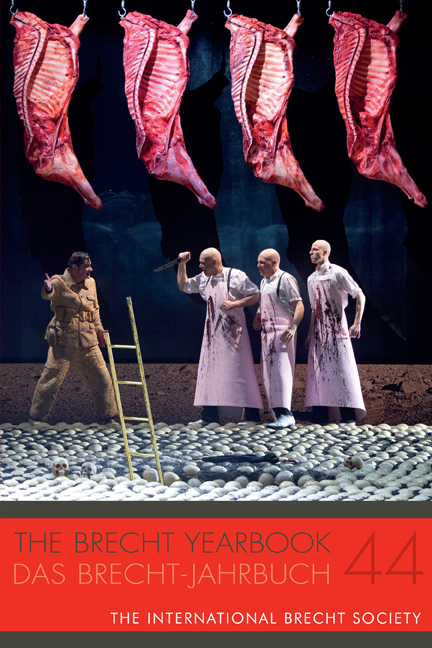Book contents
- Frontmatter
- Officers of the International Brecht Society
- Contents
- Editorial
- List of Abbreviations
- Brecht, Günter Kunert, and Edgar Lee Masters
- Brecht’s Dramatic Fragments
- Pure Joke: The Comedy of Theater since Brecht
- New Brecht Research
- Book Reviews
- Notes on the Contributors
- Now at De Gruyter Exilforschung Ein Internationales Jahrbuch
Post-Communist Irony: Bertolt Brecht’s Mr. Keuner in Heiner Müller’s Interviews
Published online by Cambridge University Press: 09 February 2021
- Frontmatter
- Officers of the International Brecht Society
- Contents
- Editorial
- List of Abbreviations
- Brecht, Günter Kunert, and Edgar Lee Masters
- Brecht’s Dramatic Fragments
- Pure Joke: The Comedy of Theater since Brecht
- New Brecht Research
- Book Reviews
- Notes on the Contributors
- Now at De Gruyter Exilforschung Ein Internationales Jahrbuch
Summary
Beyond the Oeuvre: Interviews with Heiner Müller
Hardly any of Heiner Müller's more strictly literary texts date from later than 1989. Apart from a play (Germania III) that was never completed, he merely penned several poems (whose actual number was afterwards strategically, albeit artificially, increased by his editors) as well as an autobiography, which he was quite reluctant to release for publication. Instead, by far the largest portion of his post-socialist oeuvre consists of interviews, the corpus of which amounts to about 1,500 pages of his complete works. In his final six years, interviews conducted with Müller appeared at least once per month, and the iconic status the author enjoyed after 1989 can be largely ascribed to their impact.
This plethora of interviews—probably unique in literary history—can be attributed to a number of reasons that are either specific to the person of Müller himself or to phenomena related to the interview as a genre. The reasons specific to Müller himself include his elevated status since 1989 as President of the Academy of Arts (East) and Artistic Director of the Berliner Ensemble. Furthermore, Müller, like other intellectuals from the German Democratic Republic who had not severed their ties to the utopian branch of communism, from 1989 onwards experienced a media-promulgated pressure to justify his stance (“medialer Rechtfertigungsdruck”)—all the more so after his contacts with members of the GDR state security service had become generally known. This pressure not only provided an incentive to give such a vast number of interviews but also underpinned the specific set of ambiguous communication strategies that Müller employed in order to meet public expectations while subverting them at the same time by the inherent irony of his statements.
One genre-related reason for the uncommonly large number of interviews is the fact that, although interviews generally revolve around the interviewee's life and ideas, in following and perusing them the audience hears a regulated concert instead of the interviewee's own individual voice. Interviewing an author implies the peculiarity that this action both aggrandizes and fetters its subject. On the one hand, the media attention directed to the life and opinions of a particular individual serves to performatively constitute their status as a public figure of general interest and importance.
- Type
- Chapter
- Information
- The Brecht Yearbook / Das Brecht-Jahrbuch 44 , pp. 178 - 201Publisher: Boydell & BrewerPrint publication year: 2019

